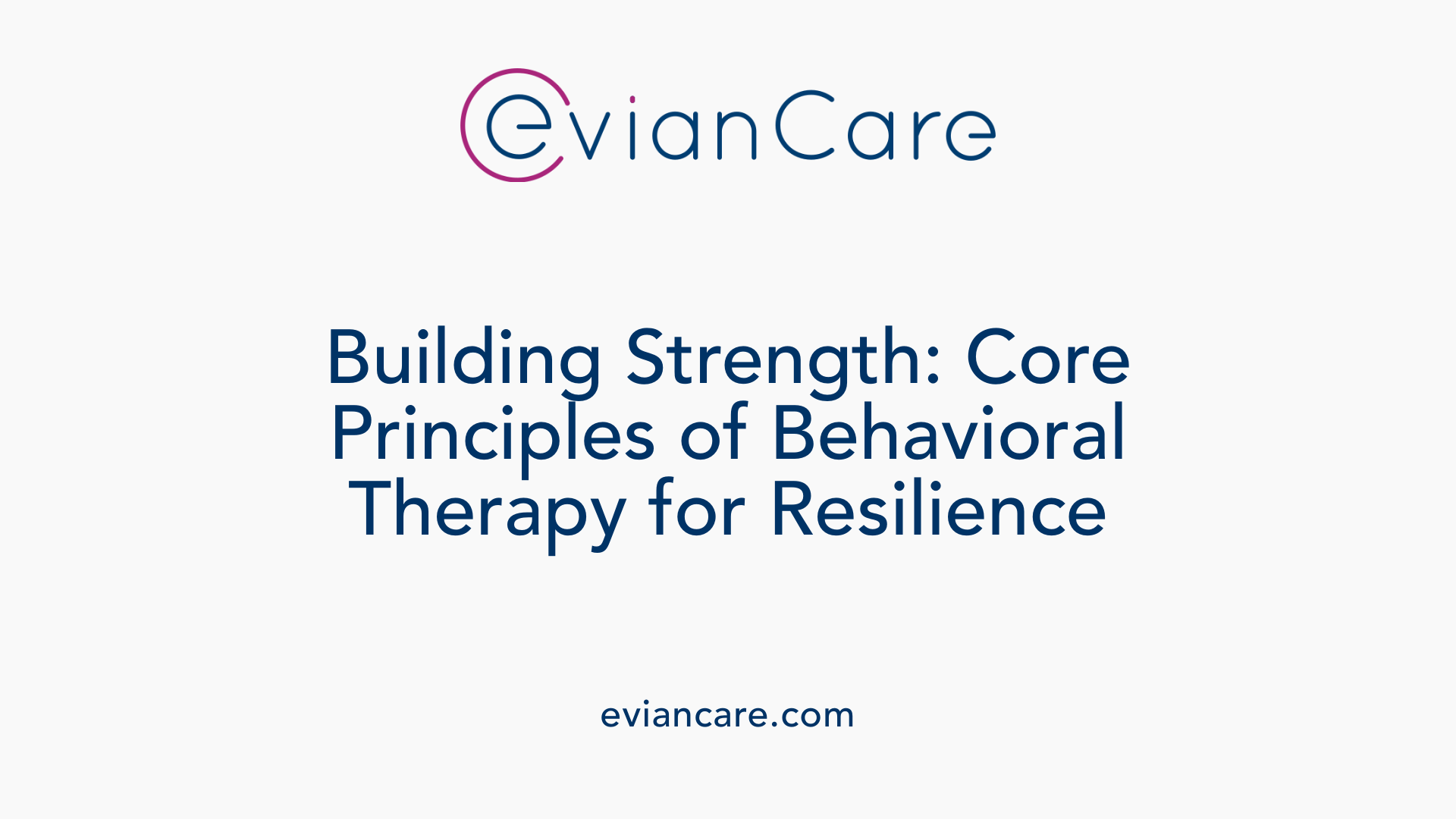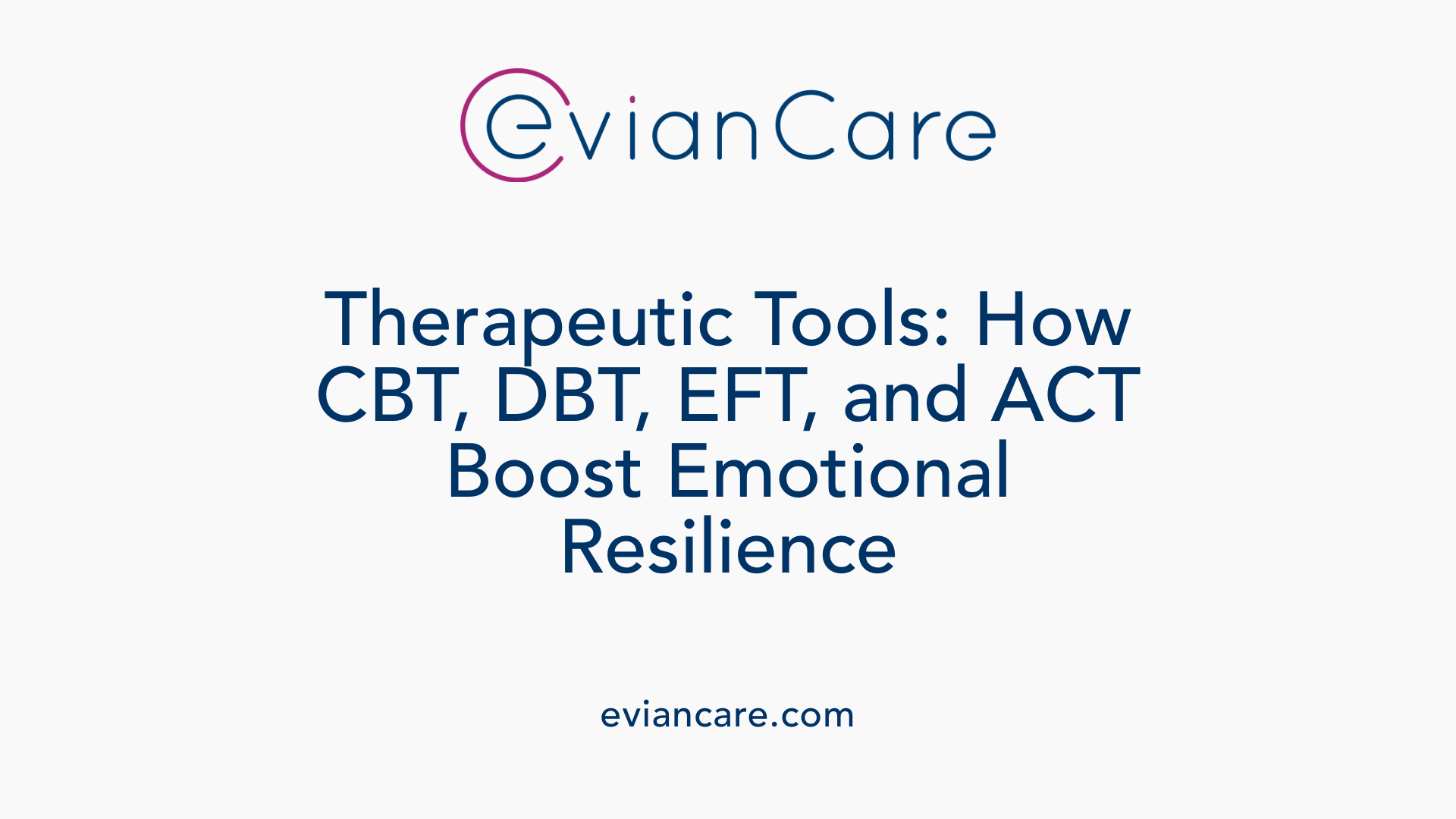
Understanding Emotional Resilience and Its Significance
Emotional resilience is the capacity to adapt, recover, and thrive despite life's adversities, stressors, and traumas. It acts as a psychological immune system, safeguarding mental and physical well-being and contributing to success across various life domains, including relationships, career, and health. Building resilience involves cultivating self-awareness, emotional regulation, social connections, and cultivating a growth mindset. Practices such as mindfulness, fostering positive outlooks, self-compassion, and seeking professional support are vital. Recognizing the biological, psychological, social, and cultural factors influencing resilience provides a comprehensive understanding of how individuals can develop this essential life skill.
Core Concepts of Emotional Resilience
What are some key concepts related to emotional resilience that are important to understand?
Understanding emotional resilience involves grasping several fundamental ideas. First, adaptability to adversity is crucial; resilient individuals can adjust their thoughts, feelings, and actions when facing challenges or unexpected changes.
Second, resilience is about recovering from setbacks. Instead of being overwhelmed by failures or difficulties, resilient people learn from these experiences and bounce back stronger.
Maintaining a positive outlook under stress is another significant aspect. This doesn’t mean ignoring problems but rather approaching difficulties with a constructive attitude that fosters hope and solution-focused thinking.
Resilience is not a static trait but a dynamic skill that can be developed over time. Building it involves practicing self-awareness and emotional regulation techniques, nurturing social connections, and cultivating a growth mindset.
Biological factors like brain activity, along with psychological, social, and cultural influences, shape resilience. Supportive relationships and healthy habits such as exercise, mindfulness, and self-compassion also play vital roles.
Ultimately, resilience acts as a mental immune system, helping individuals manage stress, protect mental and physical health, and increase success in personal and professional life.
Practicing techniques like mindfulness, realistic optimism, and seeking professional support when necessary can enhance resilience. Developing a resilient mindset allows people to face life's ups and downs with greater strength, flexibility, and hope.
Fundamentals of Behavioral Therapy and Resilience Development

What is behavioral therapy and how does it relate to building resilience?
Behavioral therapy encompasses a range of clinical approaches aimed at improving emotional and psychological well-being through targeted interventions. Its concepts originate from the understanding that thoughts, emotions, and behaviors are interconnected. By modifying maladaptive patterns and promoting healthy coping strategies, behavioral therapy enhances an individual’s ability to adapt and thrive despite adversity.
Scientific foundations behind behavioral interventions for resilience
Research in psychology and neuroscience has validated the effectiveness of behavioral therapy in fostering resilience. Techniques such as cognitive restructuring and mindfulness-based practices are based on evidence that changing distorted thoughts and cultivating present-moment awareness can strengthen emotional regulation. This biological and psychological basis demonstrates that resilience is not solely innate but can be nurtured through structured, scientifically grounded interventions.
Types of interventions used to enhance resilience
Behavioral therapy offers various methods to develop resilience, including:
| Intervention Type | Description | Goals and Benefits |
|---|---|---|
| Cognitive Behavioral Therapy (CBT) | Focuses on identifying and modifying negative thought patterns | Promotes balanced thinking, emotional regulation, and problem-solving skills |
| Dialectical Behavior Therapy (DBT) | Combines mindfulness with emotional regulation and interpersonal effectiveness | Builds emotional resilience, reduces self-destructive behaviors |
| Acceptance and Commitment Therapy (ACT) | Encourages acceptance of difficult emotions and valued actions | Enhances psychological flexibility and sustained adaptation |
| Resilience Counseling | Integrates cognitive-behavioral techniques with positive psychology | Develops inner strength, flexibility, and stress management |
| Mindfulness-Based Strategies | Practices that foster present-moment awareness | Reduces stress, enhances emotional control |
How core elements of emotional resilience can be developed through behavioral therapy
Key factors such as self-awareness, emotional regulation, social support, and a growth mindset form the foundation of resilience. Behavioral therapy techniques like emotional regulation training, cognitive restructuring, and stress management help reinforce these elements. For example, Cognitive Behavioral Therapy assists in identifying irrational beliefs and replacing them with adaptive thoughts, leading to better emotional responses.
Supporting personal growth and well-being
An ongoing commitment to applying resilience skills within daily life, supported by professional guidance, leads to long-term improvements. Regular practices such as paced breathing, positive thinking, and maintaining social connections are reinforced through therapy. As a result, individuals develop a resilient mindset characterized by optimism, flexibility, and the capacity to bounce back from setbacks.
Engaging with behavioral therapy provides a structured approach to cultivating resilience, empowering individuals to handle stress more effectively, maintain emotional stability, and ultimately enhance their overall well-being.
Evidence-Based Insights into Behavioral Therapy Effectiveness
Research studies and meta-analyses provide strong support for the effectiveness of behavioral therapy techniques in promoting resilience. A comprehensive review published in the Journal of Behavioral and Cognitive Therapy analyzed 43 research articles focusing on adult resilience and CBT interventions. The meta-analyses demonstrated that CBT significantly enhances resilience immediately after treatment, with a standardized mean difference (SMD) of 0.73 (p=0.007), indicating a meaningful improvement.
Moreover, the benefits of CBT extend beyond the immediate post-intervention period. Follow-up assessments revealed that individuals maintained their enhanced resilience, with an SMD of 1.17 (p=0.05), suggesting long-lasting effects. These findings underscore CBT’s role in not only improving resilience temporarily but also fostering sustained adaptive capacities.
Cognitive-behavioral therapy's success in building resilience is supported by its focus on restructuring maladaptive thoughts, developing effective coping strategies, and reducing avoidance behaviors. Such techniques help individuals better manage stressors and adverse situations. For example, CBT interventions tailored for people recovering from substance use, trauma, or facing chronic health challenges have demonstrated significant increases in resilience scores and related mental health parameters.
Dialectical Behavior Therapy (DBT), an evolution of CBT, also contributes to resilience by emphasizing mindfulness, emotional regulation, and interpersonal effectiveness. Developed by Marsha Linehan in the late 1980s, DBT integrates cognitive restructuring with acceptance and mindfulness principles. Studies show that practicing these skills enhances emotional resilience, reduces maladaptive behaviors, and fosters better stress management.
The long-term benefits of these therapies include improved emotional stability, better interpersonal relationships, and increased ability to navigate life's ups and downs. For instance, individuals who undergo resilience counseling or participate in resilience-focused therapy programs report higher levels of adaptive functioning and overall well-being over time.
In summary, the latest research underscores that behavioral therapies like CBT and DBT are highly effective tools for enhancing resilience. They help individuals develop coping skills, emotional regulation, and a growth mindset that are crucial for thriving amidst adversity. As evidence accumulates, integrating these approaches into broader mental health services becomes increasingly essential for fostering long-lasting psychological resilience.
Practical Strategies within Behavioral Therapies for Building Emotional Stability
What are some practical strategies within behavioral therapies that help build emotional stability and manage stress?
Behavioral therapies employ several practical techniques designed to strengthen emotional resilience and reduce stress. One fundamental approach is cognitive restructuring, a core element of cognitive-behavioral therapy (CBT). This method involves identifying, challenging, and reframing negative or irrational thoughts that can fuel emotional distress. By transforming maladaptive beliefs into more realistic perspectives, individuals can develop healthier emotional responses.
Another essential strategy is mindfulness exercises. Practicing mindfulness enhances nonjudgmental awareness of one’s present-moment experiences, including thoughts, feelings, and bodily sensations. Regular mindfulness practice helps individuals observe their emotions without becoming overwhelmed or reacting impulsively, promoting emotional regulation.
Emotion regulation skills form the backbone of managing intense feelings. Techniques such as cognitive reappraisal—reinterpreting a situation to change its emotional impact—acceptance of emotions, and distress tolerance—using skills like paced breathing or distraction—equip individuals to respond adaptively during emotional challenges.
Stress management is further supported through exposure-based techniques, which involve gradual confrontation of feared or avoided situations. This systematic exposure reduces avoidance behaviors and diminishes anxiety over time.
Healthy behavioral habits also contribute significantly to emotional resilience. Engaging in regular physical activity, practicing relaxation exercises like deep breathing or progressive muscle relaxation, and maintaining a balanced lifestyle with proper sleep, nutrition, and social connections all bolster psychological strength.
When integrated into evidence-based therapies such as CBT, these strategies collectively facilitate emotional stability. They empower individuals to better assess their emotional states, respond constructively to stressors, and sustain a sense of well-being amid life's challenges.
Roles of Specific Behavioral Therapy Modalities in Fostering Resilience

How does behavioral therapy, including CBT, DBT, EFT, and ACT, improve emotional resilience?
Behavioral therapies such as Cognitive Behavioral Therapy (CBT), Dialectical Behavior Therapy (DBT), Emotional Freedom Technique (EFT), and Acceptance and Commitment Therapy (ACT) play a significant role in strengthening emotional resilience.
CBT is renowned for its effectiveness in addressing maladaptive thoughts and behaviors. It helps individuals recognize and reframe unhelpful thinking patterns, which fosters realistic perspectives and better stress management skills. Techniques like cognitive restructuring and exposure therapy enable people to face fears and reduce avoidance, contributing to improved emotional regulation.
DBT, a form of CBT, emphasizes mindfulness, distress tolerance, emotion regulation, and interpersonal effectiveness. Its structured skills training enhances the ability to tolerate emotional discomfort, regulate intense feelings, and improve relationships, all of which boost resilience.
EFT focuses on exploring and transforming core emotions tied to attachment and past experiences. It promotes emotional awareness, self-compassion, and emotional regulation, helping individuals build inner strength to handle stressful situations more adaptively.
ACT integrates mindfulness and acceptance strategies, encouraging individuals to accept difficult emotions without judgment. By clarifying personal values and committing to value-driven actions, clients develop psychological flexibility, which is crucial for resilience.
Collectively, these therapies strengthen resilience by teaching skills such as emotional regulation, cognitive reframing, acceptance, and problem-solving. They empower individuals to adapt to adversity, manage stress effectively, and recover from setbacks, thereby promoting overall emotional well-being.
Research evidence supports that incorporating these therapeutic strategies enables people to maintain mental health during challenging circumstances. Whether through the structured skill-building of DBT or the acceptance-based approaches of ACT, behavioral therapies foster resilience by enhancing self-awareness, emotional control, and adaptive thinking.
| Therapy Type | Main Focus | Techniques | Impact on Resilience |
|---|---|---|---|
| CBT | Thought and behavior modification | Cognitive restructuring, exposure | Develops realistic thinking and coping skills |
| DBT | Emotional regulation and interpersonal skills | Mindfulness, distress tolerance, emotional regulation | Strengthens patience, emotional stability, and relationships |
| EFT | Emotional awareness and transformation | Emotional exploration, narrative rewriting | Builds internal emotional resilience and self-compassion |
| ACT | Mindfulness and values-based living | Acceptance, cognitive defusion, committed action | Enhances psychological flexibility and personal meaning |
In sum, these modalities provide valuable tools that equip individuals not only to withstand stress but to grow and thrive amidst adversity, ultimately fostering a resilient mindset and emotional stability.
The Connection Between Thought Patterns, Beliefs, and Emotional Regulation

How do thoughts influence emotions?
Thoughts significantly shape our emotional responses. When we interpret a situation with negative or irrational thoughts, we are more likely to experience emotions like anxiety, anger, or sadness. Conversely, positive or balanced thoughts can foster feelings of calm, hope, and optimism. This cyclical relationship means that changing our thinking patterns directly impacts how we feel.
What is cognitive restructuring?
Cognitive restructuring is a core technique used in cognitive-behavioral therapy (CBT) that involves identifying, challenging, and modifying negative or unhelpful thought patterns. By questioning the validity of these thoughts and replacing them with more realistic or positive ones, individuals can improve their emotional responses. This process helps reduce emotional distress and promotes adaptive thinking.
How does belief modification facilitate resilience?
Core beliefs—deep-seated assumptions about oneself, others, and the world—heavily influence our coping strategies. Unhelpful beliefs like perfectionism or catastrophizing can undermine resilience. Modifying these beliefs through therapeutic techniques enables individuals to view challenges as manageable, fostering a resilient attitude. When beliefs align with reality and promote self-efficacy, people are more likely to persevere through difficulties.
What is the impact on resilience?
By changing negative thought patterns and core beliefs, individuals develop better emotional regulation skills. They learn to respond constructively to stressors, reducing impulsivity or avoidance behaviors that weaken resilience. Enhanced emotional regulation supports flexibility and adaptability, enabling individuals to bounce back more effectively from setbacks.
How does behavioral therapy utilize this connection?
Behavioral therapies, especially CBT, leverage the link between thoughts, beliefs, and emotions to build resilience. Through exercises that promote cognitive restructuring, individuals strengthen their mental agility. This empowerment leads to improved stress management, healthier relationships, and a more optimistic outlook. As a result, emotional resilience becomes an achievable goal, embedded within everyday thinking and behavior.
| Aspect | Explanation | Additional Details |
|---|---|---|
| Thought influence | Thoughts shape emotional responses directly. | Negative thoughts heighten distress; positive thoughts promote calm. |
| Cognitive restructuring | Technique to alter unhelpful thoughts. | Involves identification, reevaluation, and replacement of thoughts. |
| Belief modification | Changes core beliefs that underpin thoughts. | Leads to more realistic and adaptive outlooks. |
| Effect on resilience | Builds emotional regulation and flexibility. | Promotes perseverance and recovery from adversity. |
| Therapy application | Used to strengthen resilience via altered thought patterns. | Incorporates mindfulness, problem-solving, and self-awareness. |
Understanding and intervening in the cycle of thoughts, beliefs, and emotions through behavioral therapy not only reduces immediate distress but also fortifies the mental foundation for resilience. This integrated approach empowers individuals to face life's challenges with greater confidence and stability.
Scientific Evidence and Future Directions in Behavioral Resilience Interventions

What evidence supports the effectiveness of behavioral therapy techniques in enhancing resilience?
Research findings provide strong support for the use of behavioral therapies like Cognitive Behavioral Therapy (CBT) and Dialectical Behavior Therapy (DBT) in fostering resilience. A comprehensive systematic review and meta-analysis published in the Journal of Behavioral and Cognitive Therapy analyzed 43 studies, revealing that CBT has a significant positive effect on resilience immediately after intervention (SMD = 0.73, p=0.007) and helps maintain improvements during follow-up periods (SMD=1.17, p=0.05).
These therapies are particularly effective in populations facing various mental health and physical conditions, including anxiety, depression, substance abuse, and recovery from trauma. CBT targets maladaptive thought patterns, teaching coping strategies that improve stress management and emotional regulation.
DBT, developed by Dr. Marsha Linehan, emphasizes mindfulness, emotion regulation, interpersonal effectiveness, and distress tolerance. It has proven particularly beneficial in reducing self-destructive behaviors and improving emotional stability, thereby enhancing resilience.
Studies show that both CBT and DBT enhance resilience by equipping individuals with practical skills to handle challenges, respond constructively to setbacks, and maintain emotional balance. This evidence underscores the importance of behavioral approaches as an effective means to strengthen resilience, with ongoing research exploring their long-term impacts and neurobiological underpinnings.
How do neuroplasticity and future neuroscience research influence resilience treatments?
Emerging neuroscience research highlights neuroplasticity—the brain's ability to reorganize and form new connections—as a foundational mechanism underpinning resilience. Interventions like CBT and mindfulness-based therapies promote neuroplasticity, leading to lasting changes in brain regions involved in emotion regulation, such as the prefrontal cortex and amygdala.
Future research aims to enhance understanding of these neural mechanisms, enabling the development of more targeted and effective resilience-building interventions. Advances in neuroimaging and brain stimulation techniques may allow personalized therapy plans that optimize neural pathways associated with emotional stability.
Moreover, exploring how genetic, environmental, and cultural factors influence neuroplasticity can help tailor interventions to individual needs, increasing their efficacy and durability.
Long-term impacts and promising research directions
Long-term benefits of resilience-focused behavioral therapies include improved mental health, better physical health, and enhanced social functioning. These therapies contribute to a strengthened ability to adapt to life's adversities, reducing the risk of relapse and chronic mental health issues.
Research is ongoing into integrating digital mental health tools, such as mobile apps and online CBT programs, which make resilience training more accessible. The combination of empirical evidence and technological innovation aims to refine these interventions further.
In summary, robust scientific evidence supports behavioral therapy techniques in promoting resilience, with future research exploring neuroplasticity, personalized treatment approaches, and innovative delivery methods to sustain and expand their benefits across diverse populations.
Fostering Resilience for a Better Future
The science and practice of behavioral therapy underscore its vital role in cultivating emotional resilience. Techniques like CBT, DBT, EFT, and ACT have demonstrated effectiveness in improving emotional regulation, fostering adaptive thought patterns, and promoting long-term psychological flexibility. As research continues to evolve, integrating neuroplasticity insights and technology-driven methods will further enhance these therapies' capacity to build resilience. Increasing awareness, accessibility, and the integration of evidence-based strategies into daily life can empower individuals to face life's challenges with strength and confidence. Ultimately, fostering emotional resilience not only improves individual well-being but also strengthens communities, workplaces, and families—creating a more resilient world for generations to come.
References
- Effectiveness of cognitive-behavioral therapy on resilience of adults
- Behavioral Health: Tips For Promoting Emotional Resilience
- DBT Skills for Mental Wellness: Building Emotional Resilience
- Understanding Emotional Resilience and How to Build It
- Becoming Resilient Through Cognitive Behavioral Therapy
- Cognitive–behavioral therapy for management of mental health and ...
- Harnessing Emotional Resilience: Exploring Dialectical Behavior ...
- 10 ways resilience counseling techniques improve wellbeing
- Strengthening Your Emotional Resilience With Emotionally Focused ...
- How Resilience Therapy Can Transform Your Emotional Regulation ...












